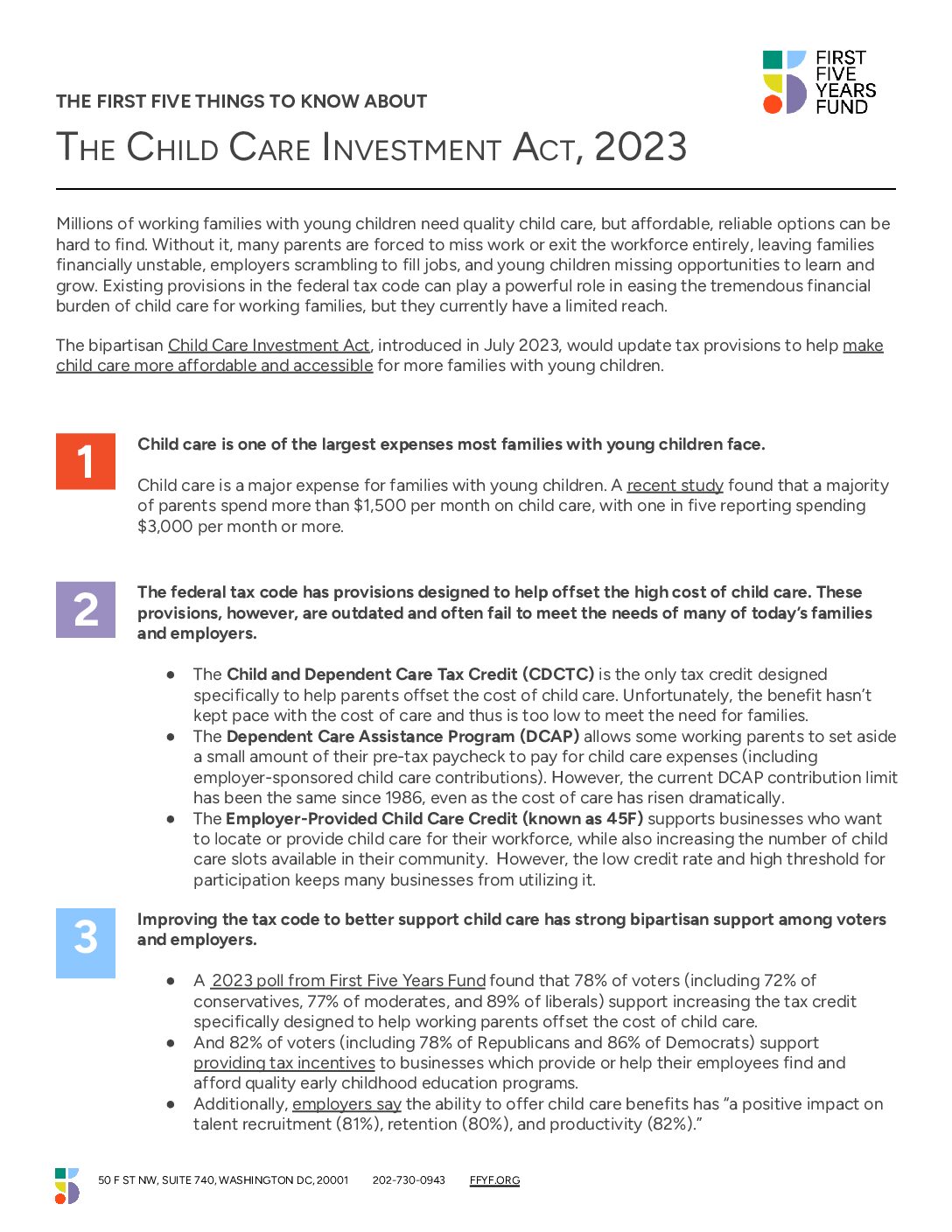The First Five Things to Know About: The Child Care Investment Act 2023

Millions of working families with young children need quality child care, but affordable, reliable options can be hard to find. Without it, many parents are forced to miss work or exit the workforce entirely, leaving families financially unstable, employers scrambling to fill jobs, and young children missing opportunities to learn and grow. Existing provisions in the federal tax code can play a powerful role in easing the tremendous financial burden of child care for working families, but they currently have a limited reach.
The bipartisan Child Care Investment Act, introduced in July 2023, would update tax provisions to help make child care more affordable and accessible for more families with young children.

Child care is one of the largest expenses most families with young children face.
Child care is a major expense for families with young children. A recent study found that a majority of parents spend more than $1,500 per month on child care, with one in five reporting spending $3,000 per month or more.

The federal tax code has provisions designed to help offset the high cost of child care. These provisions, however, are outdated and often fail to meet the needs of many of today’s families and employers.
- The Child and Dependent Care Tax Credit (CDCTC) is the only tax credit designed specifically to help parents offset the cost of child care. Unfortunately, the benefit hasn’t kept pace with the cost of care and thus is too low to meet the need for families.
- The Dependent Care Assistance Program (DCAP) allows some working parents to set aside a small amount of their pre-tax paycheck to pay for child care expenses (including employer-sponsored child care contributions). However, the current DCAP contribution limit has been the same since 1986, even as the cost of care has risen dramatically.
- The Employer-Provided Child Care Credit (known as 45F) supports businesses who want to locate or provide child care for their workforce, while also increasing the number of child care slots available in their community. However, the low credit rate and high threshold for participation keeps many businesses from utilizing it.

Improving the tax code to better support child care has strong bipartisan support among voters and employers.
- A 2023 poll from First Five Years Fund found that 78% of voters (including 72% of conservatives, 77% of moderates, and 89% of liberals) support increasing the tax credit specifically designed to help working parents offset the cost of child care.
- And 82% of voters (including 78% of Republicans and 86% of Democrats) support providing tax incentives to businesses which provide or help their employees find and afford quality early childhood education programs.
- Additionally, employers say the ability to offer child care benefits has “a positive impact on talent recruitment (81%), retention (80%), and productivity (82%).”

The Child Care Investment Act of 2023 (H.R. 4571), introduced by Reps. Salud Carbajal (D-CA) and Lori Chavez-DeRemer (R-OR), could help more families and employers, including:
- Increasing current CDCTC rates for all eligible incomes, with a family with two or more children eligible to get up to $3,000 in credits for child care expenses, while also indexing index the credit to inflation to better reflect increase child care costs;
- Making the CDCTC fully refundable so lowest-income families can receive the full benefit;
- Expanding the 45F tax credit aimed at helping employers provide child care options to their employees;
- Allowing multiple businesses to partner to create a new child care option for their employees; and
- Doubling the amount of money that can be saved by a family in a tax-exempt Dependent Care Flexible Spending Account (DCAP) to cover child care expenses up to $10,000 annually.

This overall goal of modernizing the tax code to help families afford child care is popular with lawmakers.
- In February 2024, the Problem Solvers Caucus endorsed the Child Care Investment Act.
- Leaders of the Bipartisan Pre-K and Child Care Caucus recently sent a letter to the Ways and Means Committee, urging their colleagues to update the tax code to help make child care more affordable.
- In early 2024, Sens. Bob Casey (D-PA), Ron Wyden (D-OR) and Patty Murray (D-WA), and Reps. Danny Davis (D-IL), Suzan Delbene (D-WA), and Linda Sanchez (D-CA), introduced the Child and Dependent Care Tax Credit Enhancement Act, which would make essential updates to the CDCTC to support child care.
- The “Right Start Child and Education Act,” introduced by Sens. Jeanne Shaheen (D-NH) and Angus King (I-ME) in February 2024, would expand the employer-provided child care credit (45F) and expand dependent care flexible spending accounts (DCAP).
The Bottom Line
Pairing tax reform with robust funding to strengthen child care supports families with young children while ensuring greater economic stability across the country. Together, strong funding and tax reform have the power to benefit working parents and young children while supporting economic stability across the country. Learn more about how adapting the tax code is a step towards more affordable child care in the United States.
Subscribe to FFYF First Look
Every morning, FFYF reports on the latest child care & early learning news from across the country. Subscribe and take 5 minutes to know what's happening in early childhood education.




